The Fast Lane to Compliance: Your Police Clearance WA Guide
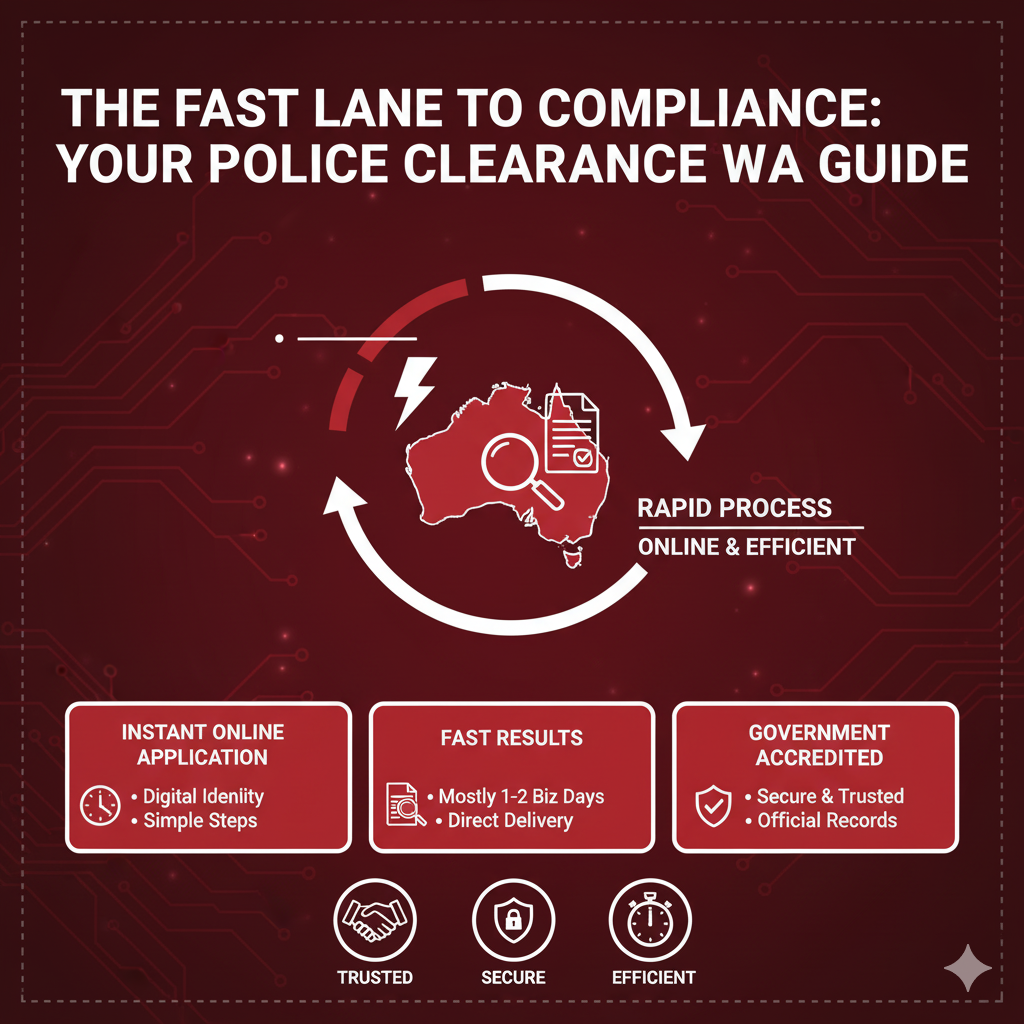
If you’re starting a new job, volunteering, or applying for a licence in the vast State of Western Australia (WA), you’ll need a National Police Certificate (NPC), often referred to as a police clearance WA. This essential document proves your character and is a mandatory requirement across numerous sectors, from mining and healthcare to aged care and education. While you can apply directly through the Western Australia Police Force, the fastest, most streamlined way to secure your police clearance WA is through an ACIC-accredited provider like Rapid Screening. We cut out the paper and postal delays, delivering 70% of all police check results within just 2-4 hours. This guide demystifies the process, explains the difference between application methods, and shows you how to get your police clearance WA certificate with maximum speed and security. Understanding the WA Police Clearance Certificate Despite the common term police clearance WA, the certificate you receive is a Nationally Coordinated Criminal History Check (NCCHC), which has national validity. What is the National Police Certificate (NPC)? The NPC is a document that summarises an individual’s disclosable court outcomes (DCOs) and pending charges from all Australian police jurisdictions, not just Western Australia. It is managed nationally by the Australian Criminal Intelligence Commission (ACIC). Crucially, the information disclosed is governed by specific legislation, including the Spent Convictions Act 1988 (WA), which dictates which older or minor offences cannot be released for general employment purposes. Why Employers in WA Demand This Check Due to its vast resources sector and critical need for high integrity in its essential services, employers in WA rely heavily on the police clearance WA for: The Fastest Way: How to Get a Police Clearance WA in Hours The key factor determining how long your police clearance WA takes is the application method. Opting for a certified online provider drastically reduces unnecessary administrative delays. You can also get a national police check. The Rapid Screening Advantage: Digital Speed As an ACIC-accredited provider, Rapid Screening offers the fastest, most reliable application channel available for individuals and businesses operating in Western Australia. 70% of Checks Delivered in 2 to 4 Hours Our streamlined, 100% online application process bypasses the manual handling associated with paper forms, post office visits, and slow data entry. This efficiency means: Secure, Online Identity Verification A major time-saver is our use of the Document Verification Service (DVS). The Manual Review: Why the Other 30% are Delayed Approximately 30% of all police checks are automatically flagged for a manual review and referred to the relevant police agencies (including WA Police) for human vetting. Common Triggers for Manual Vetting If the system refers your application, the WA Police and other agencies must complete their thorough review before you can receive the result. No accredited provider can expedite this necessary police process. Traditional Application Routes (The Slower Alternatives) While Rapid Screening provides the fastest service, there are other methods for obtaining a police clearance WA, though they typically involve longer processing times. Application Method Typical Processing Time Pros Cons ACIC Accredited Online (Rapid Screening) 70% in 2-4 Hours Fastest turnaround, 100% digital, secure DVS verification. Not issued directly by WA Police Force. Western Australia Police Force (Direct) Up to 15 Business Days Certificate is explicitly issued by WA Police. Slower, often requires paper forms or post office ID checks. Australian Federal Police (AFP) Varies (often 5+ Days) Required for specific Commonwealth or visa purposes. Not typically necessary for standard WA employment. Compliance Corner: WA Spent Convictions The Spent Convictions Act 1988 (WA) is a vital piece of legislation that protects individuals from having older, minor convictions continually disclosed. What the WA Spent Convictions Act Does For Western Australia to consider a conviction spent and therefore not disclose it on a general police clearance it must meet conditions such as: If a conviction is spent, employers cannot legally discriminate against you based on that record. This is a critical legal aspect of the police clearance WA system. Exemptions to Spent Convictions However, certain roles are exempt from the Spent Convictions scheme. For these high-risk areas, even a spent conviction will be disclosed. If you apply for one of these roles in WA, expect a fuller disclosure of your history. Conclusion When you need a police clearance WA certificate for employment or licensing, speed and compliance matter. An ACIC-accredited provider like Rapid Screening issues your official Nationally Coordinated Criminal History Check (NCCHC), which is valid and accepted throughout Western Australia. By choosing our 100% online, secure system, you bypass unnecessary delays and give yourself the best chance of receiving your police clearance WA result within 2 to 4 hours. Focus on your new opportunity, let us handle the check with unmatched speed and reliability. Frequently Asked Questions (FAQs) Q1: Is a National Police Certificate from Rapid Screening valid in WA? A: Yes. The ACIC issues the certificate as a Nationally Coordinated Criminal History Check. It is valid and legally accepted by all employers, licensing bodies, and organisations in Western Australia that require a standard police clearance WA certificate. Q2: How long is a police clearance WA certificate valid for? A: The certificate is a “point-in-time” check, meaning it only reflects your criminal history up to the date of issue. There is no national expiry date. However, most organisations in Western Australia require a certificate issued within the last 3 to 12 months as part of their risk management policy. Q3: What is the cost difference between applying through WA Police and Rapid Screening? A: Costs vary depending on the provider and the purpose (employment or volunteer). While the WA Police Force currently charges a set fee for their National Police Certificate, ACIC-accredited providers like Rapid Screening offer a comparable price structure with the added benefit of a guaranteed faster, fully online process and instant digital delivery. Q4: If I have lived in other states, will the WA Police Clearance show those records? A: Yes. The certificate is a National Police Certificate. It searches and discloses relevant records from
Stop Waiting: The Definitive Guide on How to Get a Police Check in Victoria Fast
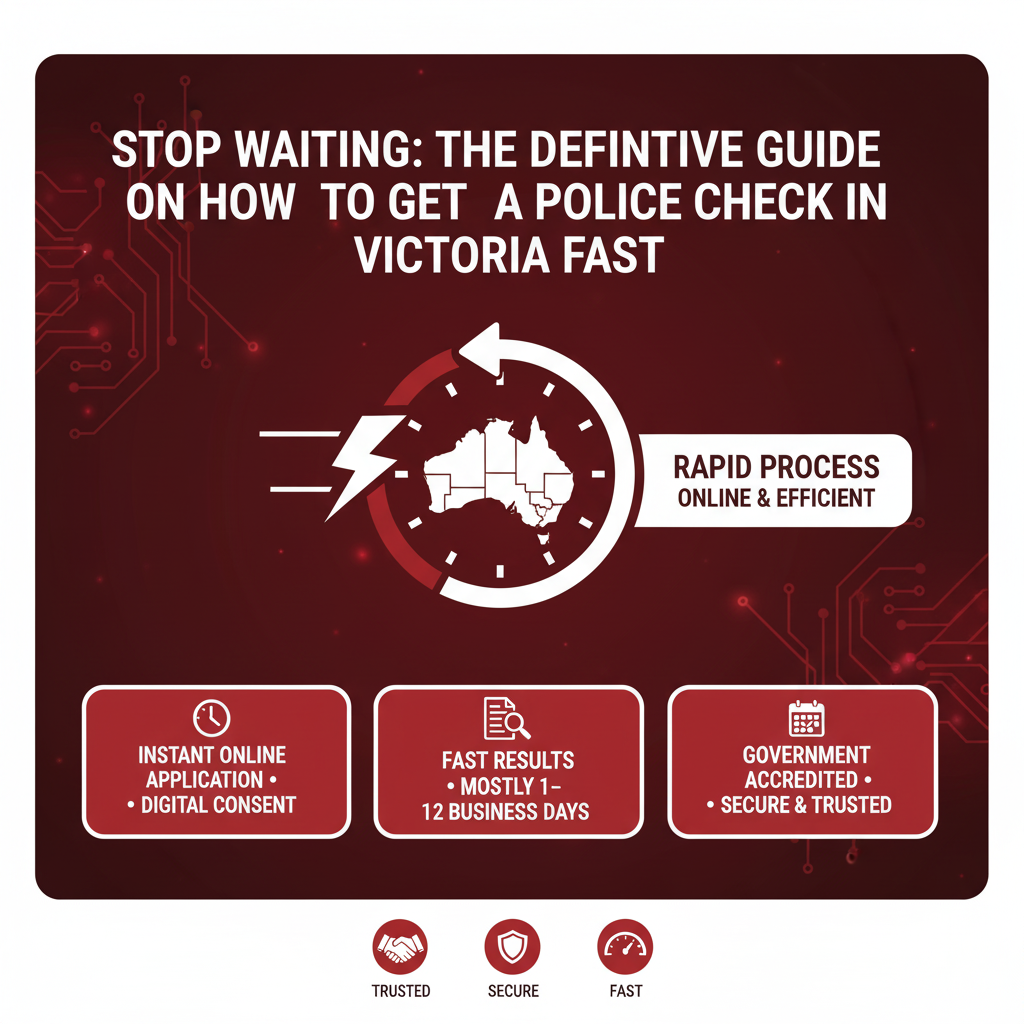
For anyone seeking employment, volunteering, or licensing in Victoria, obtaining a police check officially known as a Nationally Coordinated Criminal History Check (NCCHC) is a mandatory requirement. While historically, this process involved long waits, paper forms, and postal delays, the digital age has revolutionized the experience. As an Australian Criminal Intelligence Commission (ACIC) accredited provider, Rapid Screening offers the fastest, most reliable way to secure your police check certificate. In fact, 70% of all results processed through our system are returned to applicants within just 2-4 hours. If you are currently asking, “What is the simplest and quickest way to get my Victorian police check?” this comprehensive guide will walk you through the entire process, explain why speed varies, and demonstrate exactly how to get a police check in Victoria without the unnecessary stress and delay. Understanding the Victorian Police Check Landscape Before diving into the application steps, it’s essential to clarify what a Victorian police check is and why you need it. What is a Nationally Coordinated Criminal History Check (NCCHC)? Despite its common name, a police check for use in Victoria is not conducted solely by the Victoria Police. It is a national check that searches the centralised records of all Australian State and Territory police agencies. This check is managed by the National Police Checking Service (NPCS), which is overseen by the Australian Criminal Intelligence Commission (ACIC). When you apply, your details are vetted against police holdings across the entire country. The result is a Nationally Coordinated Criminal History Check certificate that outlines any Disclosable Court Outcomes (DCOs) based on the relevant state legislation, including Victoria’s Spent Convictions scheme. Why is a Police Check Required in Victoria? The demand for police checks in Victoria is high across numerous sectors to ensure public safety and manage risk. Common purposes include: Regardless of your reason for needing the certificate, the fastest route is knowing how to get a police check in Victoria via an accredited online body. The Fastest Way: How to Get a Police Check in Victoria with Rapid Screening Choosing an ACIC-accredited provider ensures your application is processed directly through the NPCS system, eliminating paper trails and postal delays. At Rapid Screening, our process is specifically engineered for maximum efficiency, making it the superior choice for applicants in Victoria. Step 1: The 100% Online Application and Identity Verification The journey for how to get a police check in Victoria begins with our user-friendly digital portal. The entire application can be completed in under 15 minutes. Step 2: Instant Submission and Rapid Clearance Once your application and ID are securely uploaded, our system instantly formats and submits the data to the NPCS. Step 3: Digital Certificate Delivery and Validation There is no waiting for a paper copy to arrive in the mail. For applicants who successfully clear the automated check: This streamlined digital delivery is the core difference in how to get a police check in Victoria quickly and reliably. Traditional Options: Other Ways to Get Your Police Check in Victoria While online accredited bodies provide the fastest service, Victorians have other, slower avenues for obtaining their official police check certificate. Applying Directly via the Victoria Police (or Service Victoria) The Victoria Police (VicPol) provides an avenue for the public to apply for a police check, usually managed through the Service Victoria portal. Applying via the Australian Federal Police (AFP) The AFP issues the National Police Certificate, which is a required check for specific purposes, such as Australian Commonwealth Government employment, Australian visa requirements (immigration), or certain overseas transactions. Why Turnaround Time Varies: What Causes Delays in Your Victoria Police Check? Even with the speed of the Rapid Screening system, approximately 30% of police checks are not returned in the initial 2 to 4 hour window. These applications are referred to the relevant police agency for manual processing (also known as ‘manual vetting’). This occurs when the NPCS computer system identifies a potential match or requires further human verification. Manual Vetting (The 30% Referral) A referral for manual review does not mean you have a criminal record; it simply means your details share characteristics with a Person of Interest (POI) in the database. Common triggers include: When this occurs, no accredited body can accelerate the process, as the check must pass through the hands of a police officer to ensure accuracy. This is a critical step in maintaining the integrity of the NCCHC system and is the same regardless of how to get a police check in Victoria. Criminal History Complexity and Victorian Spent Convictions If you do have an existing criminal history, the application will always be referred for manual processing. The delay here is due to the complex legal framework governing disclosure. Preparing Your Application: Critical Steps for Success To secure the fastest possible result when deciding how to get a police check in Victoria, preparation is key. Required Identity Documents (The 100 Point Check) Gather your documents before starting the online application. To pass the DVS check, you need clear, legitimate documents that add up to 100 points, typically including: Purpose of Check Ensure you select the correct purpose of the check. The purpose (e.g., “Employment Aged Care,” “Volunteer Sporting Club”) dictates which Spent Convictions and information release policies are applied to your records. Selecting the wrong purpose will invalidate your certificate and require you to apply and pay again. This is a simple but vital step when learning how to get a police check in Victoria. Conclusion The days of slow, uncertain police checks in Australia are over. For anyone needing a Nationally Coordinated Criminal History Check for employment, volunteering, or licensing in Victoria, the choice of application method determines your waiting time. By choosing Rapid Screening, you are selecting the fastest possible route, with 70% of results delivered within 2 to 4 hours via a secure, fully online process. Our platform eliminates common delays and ensures your application is accurately and instantly submitted to the ACIC NPCS system. Stop delaying your career
Stop Waiting: How Long Does a Police Check Take in Australia with Rapid Screening?
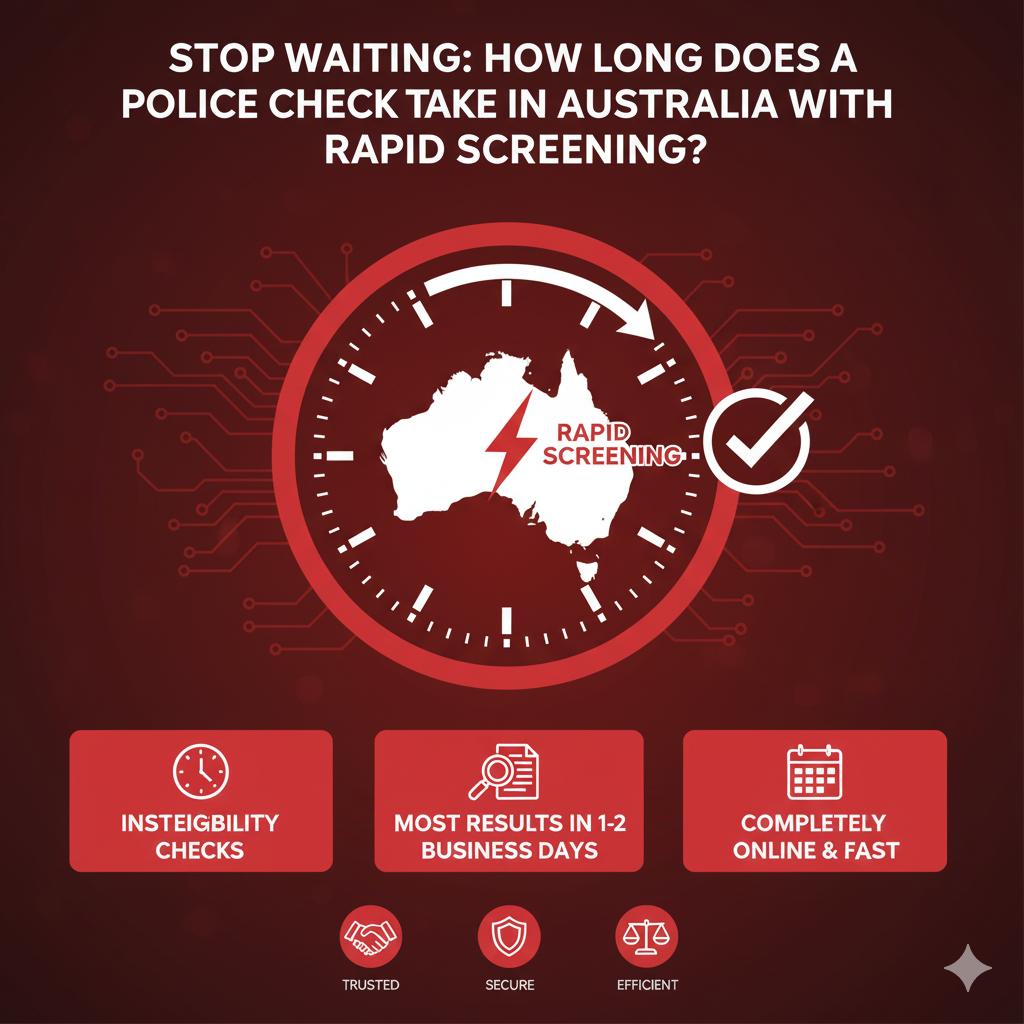
In the critical moments of hiring or applying for a new role, time is money. That’s why the most common question we hear is: How long does a police check take in Australia? With an ACIC-accredited provider like Rapid Screening, we deliver results for the majority of people within hours not days or weeks. Rapid Screening’s advanced technology and direct system integration mean we offer industry leading speed. Our platform returns 70% of all police check results to applicants within 2–4 hours of submission. This guide breaks down the process, explains the rapid turnaround, and details the factors that cause the remaining checks to take longer. The Rapid Screening Advantage: Fast-Tracked Results Every police check in Australia is officially known as a Nationally Coordinated Criminal History Check (NCCHC). All applications must pass through the same central government database and police agencies. However, the way you submit and we receive your application determines the final turnaround time. Tier 1: The Express 2-4 Hour Turnaround (70% of Checks) The national system finalises the vast majority of applications almost immediately. Tier 2: The Manual Police Referral (30% of Checks) Approximately 30% of applications are flagged as a ‘potential match’ and require manual review by a police officer. This is the only factor that extends how long does a police check take in Australia. Factors That Delay Your Police Check Processing Time While Rapid Screening processes your application instantly, the police referral process is outside the control of any accredited body. You can get these checks in SA, TAS and others as well. These factors increase the likelihood of your application falling into the 30% that require manual vetting: Identity Complexity and Common Names The primary cause of a delay is a name/date of birth combination that is similar to an individual on the criminal database. Existing Criminal History or Complex Records If the applicant has a Disclosable Court Outcome (DCO), the manual vetting is mandatory. How to Guarantee the Fastest Possible Police Check You cannot eliminate the risk of a police referral, but you can control every step of the submission process to ensure maximum speed and efficiency. The Three Golden Rules for a Rapid Police Check By following these steps, you position your application to join the 70% of police checks returned within 2–4 hours — answering the question of how long does a police check take in Australia. Frequently Asked Questions (FAQs) Q1: Does a delay mean I failed my police check? A: No — a delay simply means a police agency has flagged your application for manual verification. This is usually due to common names or other administrative complexities. The majority of referred checks still result in a No Disclosable Court Outcome (NDCO). Q2: What is the maximum time a police check can take? A: While we return 70% of results within 2–4 hours, we refer approximately 30% for manual vetting, which can take anywhere from 1 to 15 business days. In rare and highly complex cases (e.g., very old records or complex interstate history), it may take longer. Q3: How long is the certificate valid for? A: A police check is a ‘point-in-time’ document, meaning it is only current on the date of issue. It does not technically “expire.” However, the organisation requesting the check (employer, volunteer group, etc.) will have its own policy, typically requiring a new check every 3 to 12 months. Q4: Can I apply for a police check if I’m not an Australian citizen? A: Yes. If you have been a resident of Australia, you can apply for an NCCHC. You simply need to meet the 100-point identity verification requirements using your passport, visa, and other valid identity documents.
The Myth of ‘Failing’: What Disqualifies You From an Australian Police Check?
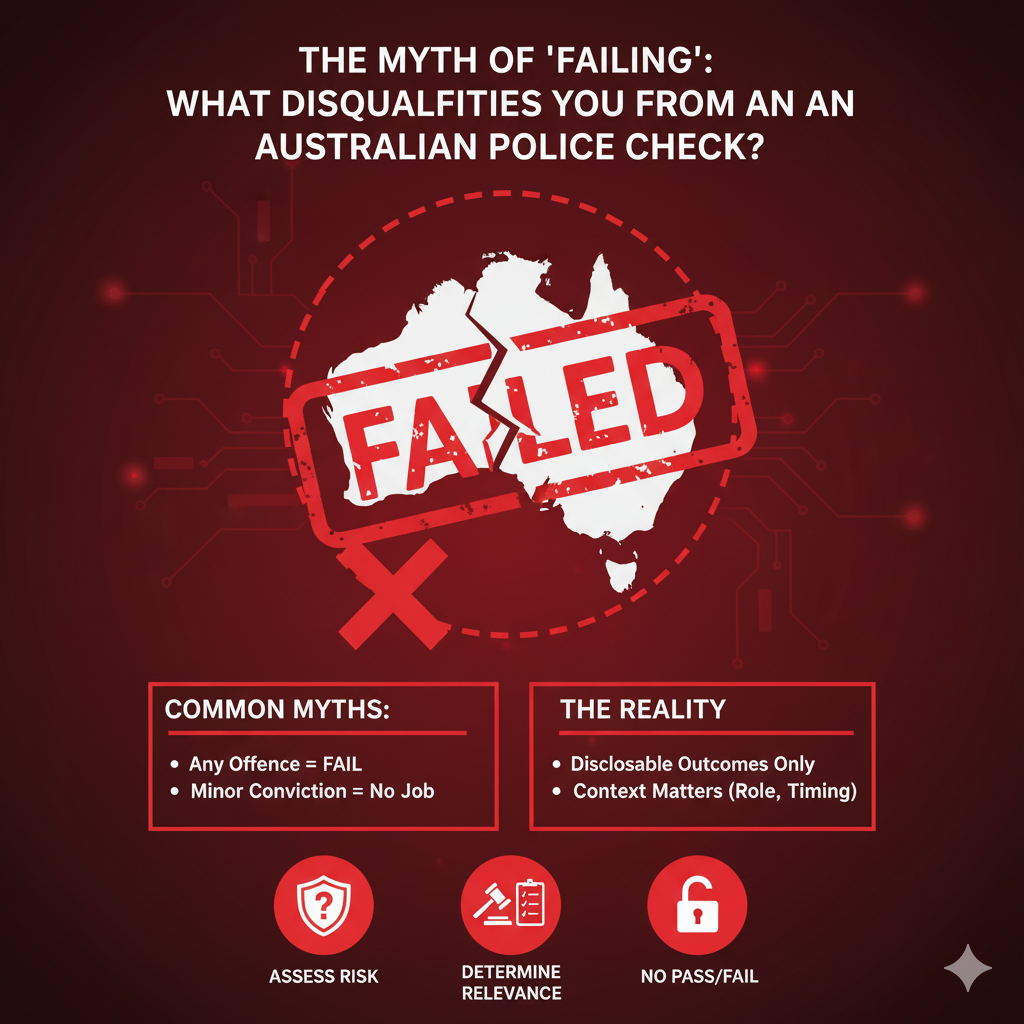
A police check in Australia doesn’t give a pass or fail it simply reports Disclosable Court Outcomes (DCOs) based on your criminal history. So, if you can’t technically “fail,” the real question for both job seekers and employers is: What Disqualifies You From an Australian Police Check? The answer lies not just in your criminal record, but in the crucial intersection of your past offences and the specific requirements of the job you are applying for. This comprehensive guide from Rapid Screening will help you understand the nuances of the Australian police check system, detailing exactly which records are disclosed and, more importantly, how employers use this information to make a hiring decision. Understanding the Nationally Coordinated Criminal History Check (NCCHC) Before discussing disqualification, it is vital to know exactly what the check reveals. The Australian Criminal Intelligence Commission (ACIC) conducts the NCCHC and gathers information from police agencies across all Australian states and territories. DCO vs. NDCO: The Real Check Outcome The result of an NCCHC will be one of two things: Disqualification is triggered when the DCO is deemed relevant and prohibitive to the job role. Therefore, when people ask, “What Disqualifies You From an Australian Police Check?” they are really asking, “What record is disclosable and relevant enough to cost me the job?” The Legal Framework: Disclosure vs. Disqualification Australian law, including the Human Rights Commission Act, generally prohibits discrimination based on an irrelevant criminal record. This means that an employer cannot lawfully disqualify a candidate unless their DCO prevents them from performing the ‘inherent requirements’ of the job. For instance, a minor historical offence for public nuisance might appear as a DCO, but it is unlikely to be relevant to a desk job in IT. However, a recent conviction for fraud is highly relevant—and thus potentially disqualifying—for a finance role. The Role of Spent Convictions: What Stays Hidden? The most common factor that prevents a conviction from appearing on a police check, and thus removing a disqualifying factor, is the Spent Convictions Scheme. These schemes operate at both the Commonwealth and State/Territory levels, designed to give individuals with minor, old offences a second chance. Criteria for a Conviction to Become ‘Spent’ While laws vary between jurisdictions (e.g., NSW, Victoria, Queensland), a conviction is generally regarded as ‘spent’ if the following criteria are met. If an offence is officially committed, it is generally not disclosed on the NCCHC certificate, and the individual is legally entitled to deny its existence, effectively eliminating it as an answer to What Disqualifies You From an Australian Police Check? Offences That Can Never Be ‘Spent’ Crucially, the Spent Convictions Scheme excludes certain serious offences, and authorities will almost always disclose them making these offences the most common reason for disqualification. These permanent disclosures often include: For roles working with vulnerable populations, these records are almost universally disqualifying. The Core Factors Determining a Negative Employment Outcome Since the NCCHC is only a disclosure of facts, the ultimate decision on What Disqualifies You From an Australian Police Check? rests with the employer’s assessment process. Rapid Screening’s clients use a risk-assessment framework based on the following key factors: Relevance to the ‘Inherent Requirements’ of the Job This is the single most important factor. An employer must prove that the criminal record makes the candidate unsuitable for the core duties of the position. Recency and Frequency of Criminal Activity An isolated, minor offence from twenty years ago will be treated differently from a series of related convictions over the last two years. Employers assess whether the offence represents a continuing risk. A pattern of repeated, similar offences demonstrates recidivism and is a strong disqualifier. The further removed the offence is from the present, the less weight it usually carries in the employment decision. The Nature and Severity of the Offence The court typically judges severity based on the penalty it imposes. A conviction resulting in a short good behaviour bond or a small fine is far less disqualifying than one that resulted in a lengthy custodial sentence. Serious violence, dishonesty, or sexual misconduct offences are considered severe, regardless of the role, making them the most common answer to What Disqualifies You From an Australian Police Check? Exemptions to Spent Convictions: When Disclosure is Mandatory Certain industries and purposes are legally exempt from the Spent Convictions Schemes. This means that even if a conviction would normally be considered ‘spent’, the relevant authorities must still disclose it on the police check certificate for these specific roles. Lawmakers created these exemptions because they consider the risk to the public interest greater than an individual’s right to non-disclosure. When a conviction is disclosed under an exemption, it becomes a powerful basis for disqualification. The most common exempt purposes include: If your historical minor conviction is relevant to one of these exempt areas, authorities will disclose it and it could disqualify you from passing an Australian police check. Conclusion: Making the Employment Decision Ultimately, the power to disqualify a candidate lies with the employer, who must apply a relevance test. What Disqualifies You From an Australian Police Check? The simple answer is a Disclosable Court Outcome (DCO) that is directly relevant to the inherent requirements of the job, particularly if it involves violence, sexual misconduct, or serious dishonesty. Rapid Screening simplifies this complex process for employers by providing accurate, Nationally Coordinated Criminal History Checks quickly and reliably. Our compliant screening services ensure you receive clear DCOs, allowing your hiring managers to confidently assess the relevance of any disclosed criminal history against the specific role, ensuring due diligence while adhering to anti-discrimination laws. Protect your business integrity and make informed hiring decisions with Australia’s trusted screening partner. Frequently Asked Questions (FAQs) Q1: Can I be disqualified for an irrelevant, minor offence? Legally, no. Australian anti-discrimination law generally prevents employers from using an irrelevant criminal record to disqualify a candidate. An employer must be able to demonstrate that the offence makes you unable to perform the ‘inherent requirements’ of the job. For
Premium Background Screening Services Australia | Elevate Trust & Security

Protect your business with professional background screening services in Australia. Ensure safe, trustworthy hiring decisions. At Rapid Screening, we empower Australian businesses and individuals with fast, secure, and fully compliant background checks. Our services go far beyond the standard police check, providing a comprehensive risk management solution designed to protect your assets, your people, and your brand. Why Comprehensive Background Screening is Essential in Australia The reliance on a CV and an interview alone is no longer adequate due diligence. Thorough background screening services Australia are the bedrock of informed hiring, particularly in sectors dealing with vulnerable people, sensitive data, or financial transactions. The Imperative for Risk Mitigation Negligent hiring claims, workplace misconduct, and fraud all stem from inadequate screening practices. Partnering with a trusted provider of background screening services Australia is a proactive step in mitigating these risks. Protecting Your Brand and Reputation Hiring an individual with a history of serious misconduct, undisclosed directorships, or falsified qualifications can severely damage public trust in your organisation. Comprehensive screening ensures that every new hire aligns with your company’s values and ethical standards, thereby safeguarding your public reputation. Ensuring Regulatory Compliance Australia has stringent legal and regulatory requirements governing employment, especially in finance, aged care, childcare, and government sectors. Specialised background screening services Australia ensure your hiring process remains compliant with state and federal laws, including the Privacy Act and the various Spent Convictions Schemes. Failure to comply can result in substantial fines and legal exposure. Key Components of Premium Background Screening Services Australia A robust screening program involves a suite of checks tailored to the specific risk profile of the role. For Australian employers, this suite often extends well beyond the Nationally Coordinated Criminal History Check (NCCHC). Deep Dive: Beyond the National Police Check While the NCCHC is foundational, many roles require a more detailed level of scrutiny that verifies professional claims, financial stability, and eligibility to work. Nationally Coordinated Criminal History Check (NCCHC) As an ACIC-accredited body, Rapid Screening provides the official NCCHC, the most common form of a police check in Australia. This reveals Disclosable Court Outcomes (DCOs) based on strict national rules, providing essential information for assessing character. We specialise in rapidly processing these checks, with results for the majority of applications returned within hours. Right to Work & Identity Verification Confirming a candidate’s identity and legal right to work is mandatory for all employers. Our services include robust ID verification against government databases and VEVO (Visa Entitlement Verification Online) checks to ensure compliance with the Department of Home Affairs regulations. This prevents fines and legal complications associated with hiring individuals not legally entitled to work in Australia. Employment and Qualification Verification Integrity starts with truthfulness on a CV. Our verification services systematically confirm: Financial and Credit Checks For roles involving fiduciary responsibility, access to significant funds, or high-level executive duties, a financial background check is crucial. This can include searches of the National Personal Insolvency Index (bankruptcy checks), court records for civil litigation relating to financial matters, and adverse financial history reports. The Rapid Screening Advantage: Compliance, Speed, and Expertise Choosing the right partner for your background screening services Australia is critical. Rapid Screening distinguishes itself by blending cutting-edge technology with rigorous compliance standards and deep local expertise. Why Choose an ACIC-Accredited Provider? Accreditation by the Australian Criminal Intelligence Commission (ACIC) is the highest standard of authority and security for processing police checks in Australia as well as in SA and QLD. It confirms that the provider meets strict security, privacy, and regulatory requirements, ensuring that your data is handled with the utmost care and that the police check certificate is official and trusted. Streamlined, Secure Digital Experience We understand that time is money in recruitment. Our online platform provides a seamless, paperless experience for candidates and recruiters alike. From digital consent forms to rapid result delivery, our streamlined process accelerates your time-to-hire without compromising on the depth or security of the check. Accuracy and Fair Assessment We pride ourselves on providing clear, accurate results that adhere to all Australian privacy laws, including the application of Spent Convictions legislation. This ensures that hiring decisions are based on relevant information, supporting a fair and consistent assessment process for all applicants. Conclusion In a world where transparency and integrity are non-negotiable, investing in comprehensive background screening services Australia is simply smart business. It is the most effective way to verify a candidate’s trustworthiness, protect your workforce from internal and external threats, and uphold your legal obligations. Rapid Screening offers the speed, security, and expertise your organisation needs to hire with absolute confidence. Secure your business’s future by making informed decisions backed by our reliable, ACIC-accredited background checks. Frequently Asked Questions (FAQs) 1. Are background screening services mandatory in Australia? While not mandatory for all roles, comprehensive background screening is a legal or industry requirement for many sectors, particularly those involving children, vulnerable people, finance, and security. Even where not legally required, it is considered due diligence by employers to mitigate risks and protect the workplace. 2. How long does a typical background screening take? The turnaround time varies depending on the types of checks required. An NCCHC (National Police Check) is often processed within a few hours (around 70% of checks). However, checks requiring manual verification, such as international police checks, employment verification, or academic verification, can take several business days to a few weeks. 3. Can a candidate refuse a background check? Yes, a candidate is always free to refuse consent for a background check. However, in most professional contexts, the refusal will mean the employer cannot proceed with their application, as the inability to verify the candidate’s background poses an unacceptable risk to the organisation. 4. What is the difference between an NCCHC and a Working with Children Check (WWCC)? An NCCHC is a point-in-time check used for general employment and various purposes. A Working with Children Check (WWCC) is a separate, dedicated screening process conducted by state authorities specifically for child-related work. It is an
Inside a Police Check: What Australians Should Know?
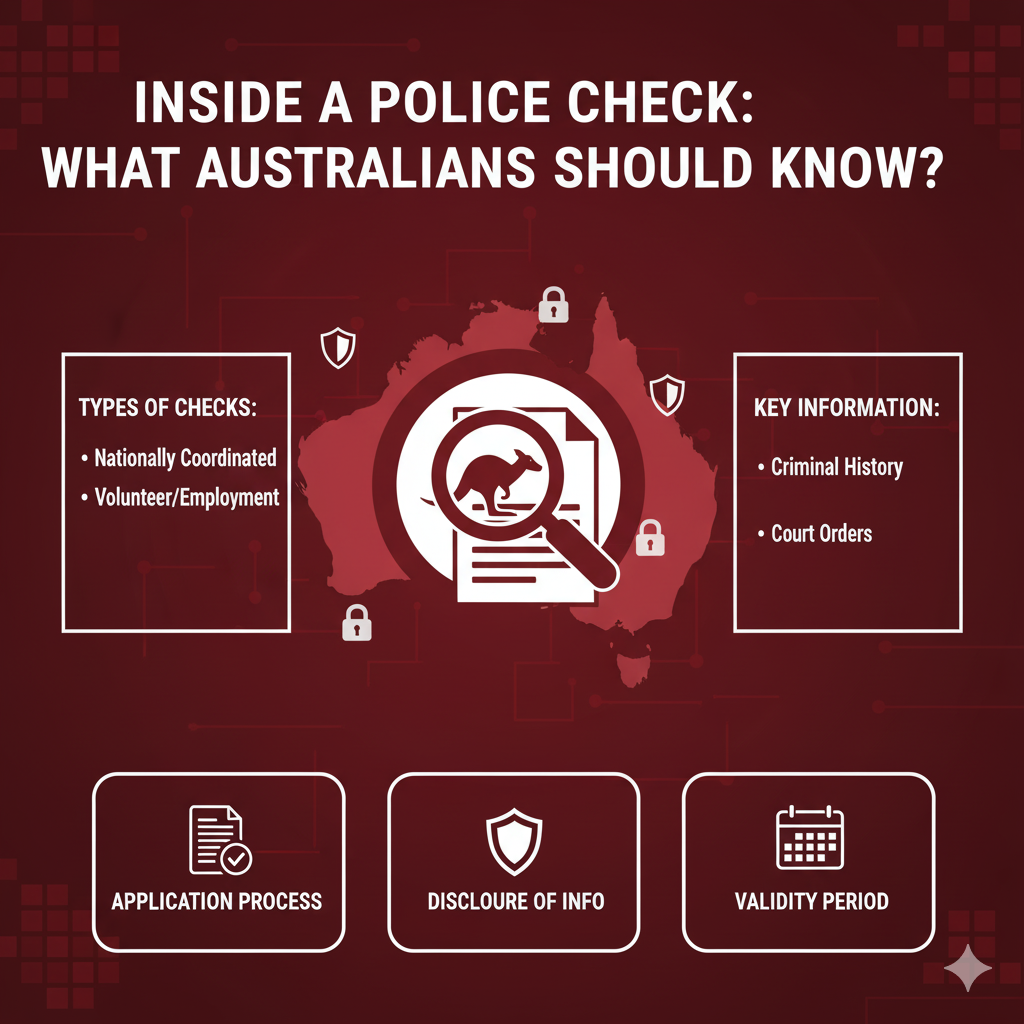
Applying for a job, volunteer role, or accreditation in Australia? Learn why a Nationally Coordinated Criminal History Check, or police check, is required. It’s natural to feel anxious about this process, particularly if you have a history of brushes with the law. The biggest question on everyone’s mind is: what comes up on a police check Australia? Will every past mistake be revealed, or are certain details protected? The answer is nuanced. A police check is not a blanket release of every single interaction you’ve had with law enforcement. It’s an official document that discloses specific court outcomes, governed by strict national and state based legislation. As an ACIC accredited provider, Rapid Screening offers a fast, secure, and clear process for obtaining your NCCHC. Here is a comprehensive breakdown of exactly what comes up on a police check Australia and what is intentionally excluded. Understanding the Two Possible Results of a Police Check When your application is processed, the certificate returned will generally contain one of two results: No Disclosable Court Outcomes (NDCO) An NDCO means that either: An NDCO is what most employers and licensing bodies look for. Disclosable Court Outcomes (DCO) A DCO means that police information was found and can be released based on the purpose of your check and the relevant legislation. This is the section that details your criminal history. The Core Information: What Comes Up on a Police Check Australia? When a check results in a DCO, the following types of information are generally released. Importantly, this information is collected from the databases of all Australian police agencies across every state and territory. Disclosable Court Outcomes (DCOs) The certificate will detail an offender’s history, which can include: The “Point in Time” Check It’s vital to remember that an NCCHC is a point in time check. This means the result is accurate only up to the specific date and time the check was issued. It does not reflect any charges or convictions that may occur after the certificate is printed. Crucial Exemptions: What Doesn’t Come Up on a Police Check Australia? Australian legislation recognises the importance of rehabilitation and limits the disclosure of less serious, older offences. Several types of information are generally excluded from an NCCHC. The Spent Convictions Scheme The most significant exclusion is the Spent Convictions Scheme. This is a legislative framework, operating at both the Commonwealth and state/territory levels, designed to prevent discrimination against individuals with minor, old criminal records. How a Conviction Becomes ‘Spent’: For a conviction to be considered ‘spent’ and therefore non disclosable, it must generally meet conditions such as: Once a conviction is spent, you are legally entitled to act as though the conviction never occurred, and it will not appear on a standard police check. Spent Conviction Exceptions However, there are exceptions. Spent convictions may still be disclosed if the check is for specific high risk purposes, such as: Other Excluded Information In most cases, an NCCHC in Australia will not disclose the following details: How Employers Interpret Your DCO If your check results in a DCO, the ultimate decision on your suitability for the role rests with the employer or licensing body. They are required to assess the information disclosed based on the principles of relevance and proportionality. A Disclosable Court Outcome doesn’t automatically mean disqualification. They will typically consider: Conclusion Knowing what comes up on a police check Australia empowers you to apply with confidence. The Nationally Coordinated Criminal History Check is a targeted document that serves to protect the community by only revealing Disclosable Court Outcomes (DCOs) and even those are strictly limited by Spent Convictions Schemes. Minor infringements and cleared charges are, in most cases, left off the record, giving reformed individuals a genuine fresh start. Rapid Screening makes getting your official NCCHC simple. Our accredited online process is quick, secure, and provides you with the verified certificate you need, often within hours. Frequently Asked Questions (FAQs) 1. How far back does a police check go? A police check officially searches your entire criminal history across Australia. However, due to Spent Convictions Schemes, information about convictions that occurred long ago and meet certain criteria (usually 10 crime free years for an adult offence) will be excluded from disclosure on the certificate. 2. Will my old traffic fines appear on the check? No, standard traffic fines or infringement notices (e.g., parking fines, minor speeding tickets) that were paid and did not result in a court conviction will not appear on your police check. Only serious traffic offences that led to a court appearance and a conviction (such as drunk driving or reckless driving) are generally disclosed. 3. Can I still get a job with a Disclosable Court Outcome (DCO)? Yes, absolutely. A DCO does not automatically disqualify you from employment. The employer must assess the relevance of the offence to the job you are applying for. Many people with old or minor convictions are successfully employed. 4. What’s the difference between a National Police Check and a Working with Children Check (WWCC)? A National Police Check is a point in time check for general employment. A Working with Children Check (WWCC) is a clearance specifically for child related work and includes continuous monitoring over the clearance period (e.g., 5 years in NSW). If you need a WWCC, you must apply for it separately through the relevant state authority. 5. Can I dispute a Disclosable Court Outcome if I think it’s wrong? Yes. If you receive a certificate with a DCO that you believe is incorrect, you have the right to dispute the record. You should contact the organisation that processed your check (like Rapid Screening) immediately, who will guide you through the formal dispute process with the Australian Criminal Intelligence Commission (ACIC) and the relevant police agency.
How to Get a police check online in NSW: A Comprehensive Guide

Get your NSW police check online easily with Rapid Screening. Learn ID requirements, WWCC differences, and apply from home with fast results. What is a Police Check in NSW? When an employer, licensing body, or volunteer organisation asks for a ‘police check’ in NSW, they are almost always referring to a Nationally Coordinated Criminal History Check (NCCHC). This check is a crucial document that details an individual’s disclosable court outcomes and pending charges across all Australian states and territories. It is a vital tool for ensuring safety, suitability, and trust in various sectors, from finance and healthcare to education and retail. The Nationally Coordinated Criminal History Check (NCCHC) The NSW Police Force does not directly issue the NCCHC for employment purposes. Instead, the National Police Checking Service (NPCS), administered by the Australian Criminal Intelligence Commission (ACIC), processes it. This is a critical distinction, as it means you do not need to visit a police station or a government office to apply. You can apply directly through an ACIC-accredited body, such as Rapid Screening, which has direct access to the national system. Who Needs a National Police Check (NPC) in NSW? The requirement for an NPC is widespread across NSW. Common scenarios where you will need one include: Why Apply Online Through an ACIC-Accredited Provider? The most convenient and often fastest way to obtain a police check in NSW is by using an online ACIC-accredited provider like Rapid Screening. This method provides significant advantages over traditional, paper-based applications submitted through some government agencies. The Authority of ACIC Accreditation Rapid Screening is a trusted, ACIC-accredited body. This is important because it confirms that the police check you receive is nationally recognised and meets the stringent standards set by the Australian Government. ACIC accreditation means: Faster, Streamlined Online Process The traditional method of applying through a local police station or government channel often involves filling out paper forms, requiring certified copies of ID, and mailing documents. This can be time-consuming and prone to errors. The online application process, facilitated by Rapid Screening, streamlines everything: Step-by-Step Guide: How to Get Your police check online NSW Getting your police check online NSW involves four simple steps. Follow this process to ensure a fast and error-free application. Step 1: Complete the Online Application Form The first step is to visit the Rapid Screening website and begin the National Police Check application. You will be asked to provide key personal details: Step 2: Meet the 100 Point ID Check Requirement To prove your identity and comply with national standards, you must satisfy the 100 Point Identification Check requirement. This is the most crucial part of the application. You will need a combination of documents that collectively reach at least 100 points, and at least one document must contain a photograph. Online accredited providers have sophisticated digital systems that can often verify these documents instantly. The documents are typically grouped into categories based on their point value. Primary Identification Documents (70 Points) You must include at least one Primary ID document. Documents in this category typically score 70 points each: Secondary Identification Documents (40 Points or Less) You will need a combination of secondary documents to reach the 100-point total. Documents in this category include: Documents with Photo/Signature (Typically 40 Points): Other Secondary Documents (Typically 25 Points or Less): How the 100 Points Are Calculated (Example): A successful combination could be: Rapid Screening’s online application system will guide you through this process, allowing you to upload digital copies or photos of your chosen documents for verification. Step 3: Consent and Submission Once your ID is verified and the application form is complete, you must provide your explicit digital consent for the NCCHC to be conducted. By ticking the relevant declaration boxes, you authorise the ACIC and Australian police agencies to search their records and release the information to Rapid Screening, who will then issue the certificate to you. Finally, you will proceed to the payment section to cover the application fee. After payment, your check is officially submitted to the National Police Checking Service. Step 4: Processing and Receiving Your Certificate The majority of applications follow a fast-tracked digital path: Police Check vs. Working with Children Check (WWCC) in NSW For anyone seeking to work or volunteer with children in NSW, a crucial point of confusion arises between the National Police Check (NPC) and the Working with Children Check (WWCC). They are not the same, and an NPC cannot be used as a substitute for a mandatory WWCC clearance. The Difference in Purpose and Scope Feature National Police Check (NPC) Working with Children Check (WWCC) – NSW Purpose General employment, licensing, and volunteer roles. Specifically assesses suitability to work or volunteer in child-related roles. Issuer ACIC-accredited bodies (like Rapid Screening). NSW Office of the Children’s Guardian. Monitoring Point-in-time check. Valid only on the date of issue. Continuous monitoring over the 5-year clearance period. Scope of Data Disclosable Court Outcomes (convictions, charges). Criminal history, plus child protection prohibition orders and relevant misconduct findings. Conclusion: Get Your NSW Police Check Online NSW Today The days of cumbersome paper forms and in-person interviews for a police check are largely over. For any individual residing in or seeking work in New South Wales, the most reliable, efficient, and secure method is to complete the Nationally Coordinated Criminal History Check (NCCHC) online through an ACIC-accredited provider. Frequently Asked Questions (FAQs) How long will it take to get my police check online NSW? The majority (around 70%) of checks are processed and returned to Rapid Screening from the national database within minutes to a few hours. We email the certificate to you immediately upon receipt. The remaining 30% are manually reviewed by police agencies and may take up to 20 business days or more. What is a Disclosable Court Outcome (DCO)? A DCO is criminal history information that is released on your police check certificate. This can include convictions, findings of guilt, and pending charges. The information released is subject to relevant state
Cheapest Police Check in Australia (2025 Guide)

Key Facts at a Glance Introduction: Why People Search for the Cheapest Police Check When Australians search for the cheapest police check, two priorities stand out: price and speed. Job seekers, students, contractors, and volunteers often need results urgently, but they also don’t want to overpay. The important thing to remember is that “cheap” should never mean “unreliable.” A police check that isn’t ACIC-accredited won’t be accepted by employers, licensing bodies, or government agencies. This guide explores: Why Accreditation Matters In Australia, there are two main authorities for official police checks: If a provider isn’t listed as ACIC-accredited, their certificates may not be legally valid. That’s why choosing a recognized provider is essential, even if the price looks attractive elsewhere. Cheapest Police Checks in 2025 Let’s look at the most affordable options on the market: Provider Price (from) Average Turnaround Accreditation Rapid Screening $51.73 + GST 2–4 hours ✅ ACIC Australia Post $54.90 5–10 business days ✅ ACIC AFP $42.00 10–15 business days ✅ AFP Key Takeaways: For most employment, licensing, and volunteering needs, Rapid Screening is the cheapest and fastest choice. How Long Does a Cheap Police Check Take? Speed is often just as important as price. Why the difference?Digital-first providers like Rapid Screening use secure online applications and automated verification, cutting out mailing delays. However, if your name matches someone with a record, your check may go through a manual review, which can take up to 10 business days. Step-by-Step: How to Apply for a Cheap Police Check Applying online is simple and secure. Here’s the process: ✅ Pro tip: Apply early in the day for the best chance of receiving same-day results. Glossary of Police Check Terms Why Rapid Screening Offers the Best Value While you might find lower prices from government agencies, Rapid Screening delivers the best overall value. Authoritativeness & Trust: Choosing Rapid Screening means saving time, avoiding delays, and ensuring your certificate is trusted everywhere in Australia. Final Verdict: Cheapest Police Check in 2025 Conclusion The demand for cheapest police checks in Australia continues to grow, especially with the rise of gig work, volunteering, and licensing requirements. But price alone isn’t enough—you need speed, reliability, and accreditation. By choosing an ACIC-accredited provider like Rapid Screening, you’ll not only pay less but also get your results faster and ensure they’re accepted nationwide. If you’re looking for the cheapest police checks in Australia, remember that price should never compromise reliability. Rapid Screening delivers the perfect combination of: For fast, affordable, and trusted police checks, Rapid Screening is the clear choice in 2025. FAQ: Cheapest Police Check in Australia Q1. What is the cheapest police check in Australia? The cheapest accredited checks in 2025 start from $51.73 + GST with Rapid Screening, delivered digitally in as little as 2 hours. Q2. Are the cheapest police checks valid for employment? Yes. As long as the provider is ACIC-accredited, the certificate is legally valid across all Australian states and territories. Q3. How long do the cheapest police checks take? Most are processed within 2-4 hours, but if flagged for manual review, it may take up to 10 business days. Q4. Can volunteers get a discounted police check? Yes. Volunteer police checks are offered at reduced rates. Charities, NFPs, and community organisations often cover or subsidise this cost. Q5. Do gig workers (Uber, NDIS, Care roles) need a police check? Yes. Platforms like Uber, NDIS providers, and disability care services all require valid police checks before allowing workers to join. Q6. Are online checks safe? With ACIC-accredited providers, yes. Applications are encrypted, and data is securely handled in compliance with privacy laws. Q7. Can a police check expire? Cheapest police checks don’t technically “expire,” but most employers require a new certificate every 12 months. Cheapest Police Check — Fast Facts in 60 Seconds Why pay more? 💰 Rapidscreening offers the cheapest, fastest, and most reliable police checks so you can save money and stay compliant. ✅
Are Police Checks for Healthcare Workers Essential or Optional?

The importance of safety and trust in the healthcare sector cannot be emphasized. Whether you’re hiring nurses, doctors, medical assistance personnel, one of the most important aspects of the hiring process is the health care police check. However, is it required by law? Or just a proposed best practice? This lesson covers the importance of police checks, whether they are mandatory or optional for Australian healthcare workers, and how they protect patients, staff, and healthcare providers. What Is a Healthcare Police Check? A healthcare police check is one type of Nationally Coordinated Criminal History Check that searches for criminal crimes that are disclosable, such as past convictions, court appearances, and current charges. On behalf of the Australian Criminal Intelligence Commission (ACIC), these investigations are managed by accredited agencies such as Rapid Screening. This check is typically required for: Making sure the patient is safe is the main objective, especially for vulnerable groups including children, the elderly, and those with disabilities. Is a Healthcare Police Check Mandatory? In fact, in most healthcare settings, a healthcare police check is required. Due to a number of laws, industry-specific regulations, and company policies, all healthcare personnel are required to submit to a police check before starting work and often on a continuing basis. Key Legal Requirements Include: Why Healthcare Police Checks Are Essential 1. Protecting Vulnerable People Patients who are weak physically or mentally are frequently around medical professionals. A healthcare police check helps make sure that these employees don’t endanger the safety and well-being of the people they are responsible for. 2. Risk Mitigation for Employers Healthcare organizations run a serious danger of financial fraud, abuse, and negligence when they hire someone without doing a complete background check. The first line of defense in risk management procedures is a police check. 3. Building Public Trust The healthcare industry depends heavily on trust. Patients want to know whether the caregivers have undergone screening and approval. By demonstrating professionalism and a commitment to safety, requiring police inspections enhances an institution’s reputation. When Should These Checks Be Conducted? Instead of being an afterthought, police checks ought to be included into every stage of the recruiting process. The candidate must submit and pass a recent police check before beginning work. What’s Included in a Healthcare Police Check? It provides a thorough summary of an individual’s criminal history in every Australian state and territory. The following results might become apparent: The level of disclosure will depend on the nature of the function and any exemptions or legal protections, like the Spent Convictions Scheme. Who Needs a Police Check in the Healthcare Sector? A police check is necessary for many jobs in the healthcare sector in order to safeguard the security and confidence of both patients and staff. Organizations closely examine not only medical personnel but also administrative and support staff. The following roles require a healthcare police check: How to Get Obtaining a health care police check can be simple when you work with Rapid Screening, an ACIC-accredited company. Steps: A trustworthy provider will complete your check quickly, securely, and in full compliance with Australian privacy regulations. If you want to know more then contact us. What Happens if a Record Is Found? If a criminal record is discovered during an applicant’s police check, firms have to decide if it is significant to the role. Employers must connect their responsibility of care with equitable hiring procedures and prevent unlawful harassment based on irrelevant records. Why Choose Rapid Screening for Healthcare Police Checks? Rapid Screening is one of Australia’s most credible and reliable background check organizations, especially for the medical industry. We commit to delivering a smooth, secure, and fully legal screening process tailored to your needs, recognizing the unique compliance requirements healthcare professionals face. Physicians, nurses, and healthcare organizations nationwide make use of rapid screening for the following reasons: Rapid Screening speeds up the screening process, saving you time, lowering risk, and guaranteeing complete compliance at every stage, whether you’re an HR coordinator managing dozens of clinical staff or a lone practitioner handling your own credentials. Conclusion The healthcare industry avoids shortcuts because the law requires thorough procedures, and doing so is essential for maintaining public trust, organizational integrity, and patient safety. Healthcare facilities and individual staff greatly benefit from conducting police checks regularly, fairly, and accurately. In most cases, the law also requires it. Frequently Asked Questions (FAQs) Q. Does Australia’s law mandate that all healthcare staff undergo a police check? Yes. The law mandates police checks for most healthcare occupations, especially in hospitals, assisted living centers, and elder care facilities. Authorities enforce this requirement through various legislation, including the Aged Care Act of 1997 and state-level health standards. Q. How frequently must police checks in the healthcare industry be renewed? Probably every three years. Organizations must update positions governed by the Aged Care Act or other state statutes every three years. However, depending on their own risk management criteria, organizations could require more frequent inspections. Q. Can I work in a healthcare setting if I have a criminal record? The type of offense will determine this. The conviction’s relevance to the position will be evaluated by the employer. Serious or recent transgressions, particularly those involving harm or dishonesty, may disqualify a candidate but minor, unrelated offenses would not. Q. Do a conventional police check and a healthcare police check differ from one another? No, a nationally coordinated criminal history check is the same as a core check. However, the healthcare industry evaluates its implementation differently, placing greater emphasis on patient safety and an employee’s fitness for tasks involving vulnerable individuals. Q. Do hospital administrative staff need a police check? Yes. Clinics and hospitals usually require even non-clinical staff—such as administrative personnel, medical receptionists, and IT personnel with access to sensitive information—to undergo a police check to meet organizational compliance. Q. Can employees in the healthcare industry use the same police check for more than one employer? Not usually. Although the police check is valid nationwide,
What is the Cost of a Police Check in Australia? | 2025 Guide

When a candidate applies for a position, volunteers, or moves to Australia, they are generally compelled to go through a police check. The cost of a police check is one of many commonly raised queries, regardless knowing that it is an extremely straightforward process. All you need to know about police check costs in Australia is explained in this extensive guide, including the many kinds, suppliers, and factors that impact their ultimate cost. Considering the cost will help you prepare efficiently and avoid unwanted postponements or costs, whether you’re a single application or a company performing bulk checks. What Is a Police Check? Any criminal convictions or offenses that a person may have committed in Australia that are subject to disclosure are listed in a police check, also called a Nationally Coordinated Criminal History Check (NCCHC). State police departments issue it directly, or authorized organizations like Rapid Screening, which act on behalf of the Australian Criminal Intelligence Commission (ACIC), may do so. Police background checks are typically necessary for: The cost of a police check might vary depending on a number of important aspects, as we discuss below, even if the procedure is the same across the country. What Does a Police Check Contain? Data about disclosable rulings from courts, pending charges, and occasionally criminal traffic infractions are all included in a typical Australian police check. It is an overview of a person’s criminal history that could affect their eligibility for a job, a license, or immigrants. Certain offenses may have more weight than others, depending on the function or sector, particularly when vulnerable people are involved. For instance, a person’s application for a job in senior care or childcare may be rejected if they have prior convictions related to misuse or harm. Average Cost of a Police Check in Australia In Australia, police check fees usually vary from $40 to $80, depending on the application process and location. The average price is broken down as follows: – Accredited Agency: $45 – $60– State Police (Online): $50 – $65– State Police (In-Person): $60 – $80– Volunteer Check: $0 – $30 (if eligible) Factors That Affect the Cost of Police Check 1. Type of Application 2. Application Channel Whether you apply in person, online, or through a third-party agency will also affect the cost of the police check. Compared to interacting directly with state police, accredited online services such as Rapid Screening may provide cheaper costs and quicker turnaround times. 3. Processing Speed For an extra charge, certain companies provide expedited or priority processing. Depending on the provider, this could cost an additional $10 to $30. 4. Location or Jurisdiction Even though the check applies nationwide, some state police offices charge much higher fees, even for in-person applications. For example: Choosing a national supplier might end up in more uniform pricing across states. Comparison Between Online and In-Person Applications Online checks through Rapid Screening typically range from $45–$55. People prefer them because they offer speed, easy digital document uploads, and 24/7 access to application services. In-person police station applications cost more ($60–$80), include paperwork, longer queues, and are only available during business hours. While they offer direct support, many find the convenience of online options outweighs this. Express services, available through some agencies, offer turnaround within 24 to 48 hours but come at a higher cost ($60–$85). Are There Any Hidden Costs? In general, the price of a police check is disclosed. However, depending on your needs, additional costs can be mandatory: It is always a good idea to carefully read the terms and conditions or consult with a screening agency before delivering your application to avoid extra fees. How to Save on Police Check Costs You can lower the cost of your police check through the application of these tips: Is a Police Check Refundable if Rejected or Cancelled? Even if the applicant cancels or authorities reject the police check due to insufficient identity, the provider usually keeps the fee after processing the request. Therefore, it makes sense to use a reliable firm that offers ID assistance, like Rapid Screening. How Long Is a Police Check Valid? The majority of organizations believe that a police check is good for three to twelve months, depending on the position, even though there is no official expiration date. Organizations may ask you for a new check if you work with sensitive groups or if your last check was over a year ago. This suggests that even while the cost might seem one-time, many professionals will need to renew their police checks frequently throughout their employment. Why Choose Rapid Screening? You are selecting one of Australia’s most reputable, ACIC-accredited police check companies when you apply through Rapid Screening. This explains why hundreds of people choose us each year: Numerous industries, including government, healthcare, education, and finance have chosen Rapid Screening as their service provider. No matter whether you manage a team or are an individual, their software adapts to your demands and makes it easier to comply with federal as well as state legislation. Their clear pricing structure, absence of additional costs, and commitment to data protection set them apart in the Australian background checking sector. Rapid Screening speeds up the application procedure and lowers the cost of the police check, regardless of whether you’re applying as an individual or as a business. Conclusion Although cost differs based on the supplier, application type, and method, the majority of Australians can easily pay and obtain a police check. Understanding the entire cost up front helps you stay compliant with no unpleasant surprises whether applying for jobs, volunteer opportunities, or immigration. To get the best deal: By paying a small money for a police check, you can make sure that you are seen as a reliable applicant, stay in accordance with industry standards, and have access to professional prospects. It’s an affordable and safe way to have your background investigated. Acquiring your police check with Rapid Screening ensures reasonable costs, prompt processing, and reliable service
